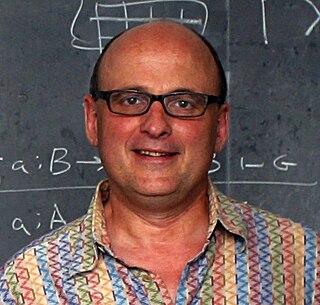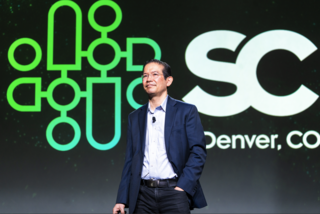Related Research Articles

The School of Computer Science (SCS) at Carnegie Mellon University in Pittsburgh, Pennsylvania, US is a school for computer science established in 1988. It has been consistently ranked among the top computer science programs over the decades. As of 2022 U.S. News & World Report ranks the graduate program as tied for second with Stanford University and University of California, Berkeley. It is ranked second in the United States on Computer Science Open Rankings, which combines scores from multiple independent rankings.

David A. Bader is a Distinguished Professor and Director of the Institute for Data Science at the New Jersey Institute of Technology. Previously, he served as the Chair of the Georgia Institute of Technology School of Computational Science & Engineering, where he was also a founding professor, and the executive director of High-Performance Computing at the Georgia Tech College of Computing. In 2007, he was named the first director of the Sony Toshiba IBM Center of Competence for the Cell Processor at Georgia Tech.

Robert William "Bob" Harper, Jr. is a computer science professor at Carnegie Mellon University who works in programming language research. Prior to his position at Carnegie Mellon, Harper was a research fellow at the University of Edinburgh.

Randal E. Bryant is an American computer scientist and academic noted for his research on formally verifying digital hardware and software. Bryant has been a faculty member at Carnegie Mellon University since 1984. He served as the Dean of the School of Computer Science (SCS) at Carnegie Mellon from 2004 to 2014. Dr. Bryant retired and became a Founders University Professor Emeritus on June 30, 2020.

Mark A. Horowitz is an American electrical engineer, computer scientist, inventor, and entrepreneur who is the Yahoo! Founders Professor in the School of Engineering and the Fortinet Founders Chair of the Department of Electrical Engineering at Stanford University. He holds a joint appointment in the Electrical Engineering and Computer Science departments and previously served as the Chair of the Electrical Engineering department from 2008 to 2012. He is a co-founder, the former chairman, and the former chief scientist of Rambus Inc.. Horowitz has authored over 700 published conference and research papers and is among the most highly-cited computer architects of all time. He is a prolific inventor and holds 374 patents as of 2023.

Manuela Maria Veloso is the Head of J.P. Morgan AI Research & Herbert A. Simon University Professor Emeritus in the School of Computer Science at Carnegie Mellon University, where she was previously Head of the Machine Learning Department. She served as president of Association for the Advancement of Artificial Intelligence (AAAI) until 2014, and the co-founder and a Past President of the RoboCup Federation. She is a fellow of AAAI, Institute of Electrical and Electronics Engineers (IEEE), American Association for the Advancement of Science (AAAS), and Association for Computing Machinery (ACM). She is an international expert in artificial intelligence and robotics.

Oyekunle Ayinde "Kunle" Olukotun is a British-born Nigerian computer scientist who is the Cadence Design Systems Professor of the Stanford School of Engineering, Professor of Electrical Engineering and Computer Science at Stanford University and the director of the Stanford Pervasive Parallelism Lab. Olukotun is known as the “father of the multi-core processor”, and the leader of the Stanford Hydra Chip Multiprocessor research project. Olukotun's achievements include designing the first general-purpose multi-core CPU, innovating single-chip multiprocessor and multi-threaded processor design, and pioneering multicore CPUs and GPUs, transactional memory technology and domain-specific languages programming models. Olukotun's research interests include computer architecture, parallel programming environments and scalable parallel systems, domain specific languages and high-level compilers.

Alexander Waibel is a professor of Computer Science at Carnegie Mellon University and Karlsruhe Institute of Technology. Waibel's research interests focus on speech recognition and translation and human communication signals and systems. Alex Waibel made pioneering contributions to speech translation systems, breaking down language barriers through cross-lingual speech communication. In fundamental research on machine learning, he is known for the Time Delay Neural Network (TDNN), the first Convolutional Neural Network (CNN) trained by gradient descent, using backpropagation. Alex Waibel introduced the TDNN in 1987 at ATR in Japan.

Rob A. Rutenbar is an American academic noted for contributions to software tools that automate analog integrated circuit design, and custom hardware platforms for high-performance automatic speech recognition. He is Senior Vice Chancellor for Research at the University of Pittsburgh, where he leads the university's strategic and operational vision for research and innovation.

Fei-Fei Li is a China-born American computer scientist, known for establishing ImageNet, the dataset that enabled rapid advances in computer vision in the 2010s. She is the Sequoia Capital professor of computer science at Stanford University and former board director at Twitter. Li is a co-director of the Stanford Institute for Human-Centered Artificial Intelligence and a co-director of the Stanford Vision and Learning Lab. She served as the director of the Stanford Artificial Intelligence Laboratory from 2013 to 2018.

Eric Poe Xing is an American computer scientist whose research spans machine learning, computational biology, and statistical methodology. Xing is founding President of the world’s first artificial intelligence university, Mohamed bin Zayed University of Artificial Intelligence (MBZUAI).
Ashok Agrawala is Professor in the Department of Computer Science at University of Maryland at College Park and Director of the Maryland Information and Network Dynamics (MIND) Lab. He is the author of seven books and over two hundred peer-reviewed publications. Glenn Ricart and Ashok Agrawala developed the Ricart-Agrawala Algorithm. The Ricart-Agrawala Algorithm is an algorithm for mutual exclusion on a distributed system. This algorithm is an extension and optimization of Lamport's Distributed Mutual Exclusion Algorithm.

Diana Marculescu is the Department Chair and Motorola Regents Chair in Electrical and Computer Engineering #2 at the University of Texas at Austin. She was formerly the David Edward Schramm Professor of Electrical and Computer Engineering at Carnegie Mellon University. She is the first female chair in the department's history.
James J. Coleman is an electrical engineer who worked at Bell Labs, Rockwell International, and the University of Illinois, Urbana. He is best known for his work on semiconductor lasers, materials and devices including strained-layer indium gallium arsenide lasers and selective area epitaxy. Coleman is a Fellow of the IEEE and a member of the US National Academy of Engineering.
Kristen Lorraine Grauman is a Professor of Computer Science at the University of Texas at Austin on leave as a research scientist at Facebook AI Research (FAIR). She works on computer vision and machine learning.
Emily Mower Provost is a professor of computer science at the University of Michigan. She directs the Computational Human-Centered Artificial Intelligence (CHAI) Laboratory.

Frederic (Fred) T. Chong is an American computer scientist known for research in computer architecture, quantum computing, and computer security.
Lawrence Pileggi is the Coraluppi Head and Tanoto Professor of Electrical and Computer Engineering at Carnegie Mellon University. He is a specialist in the automation of integrated circuits, and developing software tools for the optimization of power grids. Pileggi's research has been cited thousands of times in engineering papers.
Robert K. Cunningham is an American computer scientist and engineer. In 2021 he became Vice Chancellor for Research Infrastructure at the University of Pittsburgh. He is a fellow of the Institute of Electrical and Electronics Engineers.
Joshua R. Smith is an American computer scientist and electrical engineer and a professor at the University of Washington. He is known for research on wireless power, backscatter communication, and robotic manipulation.
References
- ↑ "Phillip B. Gibbons". www.cs.cmu.edu. Retrieved 2018-01-25.
- ↑ "Intel labs to be replaced with specialized centers - The Tartan". thetartan.org. Retrieved 2018-01-25.
- ↑ "Phillip B. Gibbons". www.cs.cmu.edu. Retrieved 2018-01-06.
- ↑ "2014 elevated fellow". IEEE Fellows Directory.